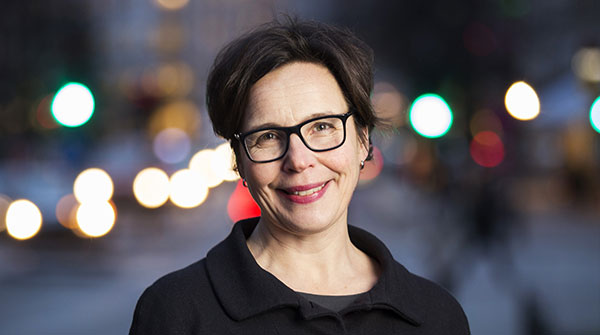
Resilience and dynamism – through the fiercest of storms
Kommuninvest plays a key role in society’s resilience. During the first phase of the pandemic, we safeguarded the local government sector’s access to credit – even when the storm was at its fiercest. A solid capitalisation plan, strengthened digital capacity and active development of our sustainability work have equipped us well for whatever lies ahead.
Resilience
The corona pandemic is a severe strain on society as a whole. The local government sector plays a key role in the common effort to resist. From the initial outbreak in Sweden, the tasks of caring for the sick, limiting the contagion
and keeping society going in other regards have fallen upon the municipalities and regions. Welfare workers have stood on the front line.
In our mission on behalf of Sweden’s municipalities and regions, Kommuninvest represents an important component in the joint resistance. Our task is to safeguard the local government sector’s access to stable and cost-efficient loan financing even when the storm is at its fiercest.Our straightforward and, at the same time,
vigorous business model, with low risks and solid buffers, must be able to deliver under all weather conditions. And it proved able to do so, even through the severe market turbulence in March and April. We held our course. Throughout, municipalities and regions were able to borrow the volumes they needed.
In April, Kommuninvest established a loan opportunity, in the form of a SEK 500 million credit, with which local government authorities could procure protective equipment through SKL Kommentus Inköpscentral. Although this represented a minor departure from our normal business model, it was, at the same time, an action entirely in line with our mission’s objective to safeguard resilience.
And, over the year, we achieved substantial progress in strengthening our own resilience, as well as that of the local government sector. An example of this was our transition to fully digital operations, and our rapid development of digital methods, from early on in the pandemic. Kommuninvest can deliver at full capacity, even when our employees are not working from the office. These are key skills worth maintaining
– even once the pandemic has subsided.
Unlike many other credit institutions, Kommuninvest does not appropriate profit to increase its capital. Instead, capital is built up by means of capital contributions from members. The resolution by the Annual General Meeting of the Society in April to build up capital in the operations will have a positive impact on the Company. This ensures a robust process building sound capacity for manoeuvre in other areas of financial management.
Dynamism
Despite the difficult times, the operations demonstrated vigorous dynamism.
Product development progressed at a strong pace. Towards the end of the year, we achieved our objective of creating a digital loan process within KI Finans. Customers are now able to complete all steps in the loan process with digital support, which increases flexibility and reduces administration. We launched a new analysis tool to support planning of investments and liquidity flows. We phased out another analysis tool, KI Finans Tillgång, which had not been useful for a sufficient number of customers. In the autumn, the process of developing a new sustainability product, Social Sustainability Loans, entered a pilot phase. With four pilot customers having been granted loans, the results, up until the end of the year, were promising.
To gain access to an independent and current analysis of the consequences of the pandemic for the local government sector, we established the external expert group “Welfare Economists”. The purpose is to contribute to a know-ledge-based public debate on issues that are complicated and important to our members. By the end of the year, two reports had been produced providing advice for the central government, municipalities and regions.
At the same time, a dark cloud of concern appeared in the autumn: the proposed risk tax presented by the Swedish government, the Centre Party and the Liberal Party. As a public development credit institution, we take the view that Kommuninvest should be exempt from tax. Without such an exception, one of several negative consequences would be that we lose some of our developmental vigour.
Constructive discussions
It is in times of difficulty that an organisation is truly put to the test. From the Board of Directors, we are able to affirm that the constructive discussions normally typical of Kommuninvest – from its 292 owners to those employed in the operations – continued to characterise the Company in 2020. The commitment and constructiveness has always been there. Not only is this gratifying. It is also a decisive strategic strength.
Kommuninvest i Sverige AB
Ellen Bramness Arvidsson
Chairman

About Kommuninvest
Kommuninvest is a municipal cooperation for efficient and sustainable financing of housing, infrastructure, schools, hospitals etc. Together, we get better loan terms than each one individually. Since its inception in 1986, the Kommuninvest collaboration has helped lower the local government sector’s borrowing costs by many billion kronor. Currently, 292 municipalities and regions are members of this voluntary cooperation. With total assets in excess of SEK 525 billion, Kommuninvest is the largest lender to the local government sector and the sixth largest credit institution in Sweden. The head office is located in Örebro.

